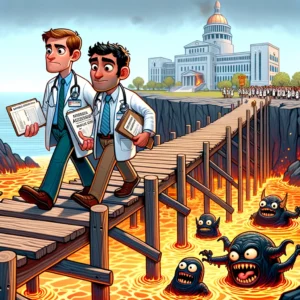
Striking a Balance Between Authenticity and Cynicism
In my eighteen years of helping people earn admission into their dream schools, two kinds of applicants are quite common. The first type sees their application as merely a means to an end. They want to know what the admissions committee wants, and they’ll then try to shoehorn their life into that mold. The second type treasures pure authenticity, and insists on featuring the most important moments of their lives in their personal statements, even if they’re not quite relevant.
Neither of these approaches are quite right; the first is too cynical and the second focuses so much on “authenticity” that it forgets its purpose. The correct path is one that splits the difference, and this is what makes crafting a perfect personal statement so perplexing and difficult. On one hand, there’s a compelling need to present oneself in a way that resonates with the Admissions Committees (AdComs). On the other, there’s the inherent desire to remain authentic to one’s true self. With that in mind, how can you blend sincerity with strategic insight to unlock the gates to top-tier business schools?
Every Kind of Writing Has a Purpose
Let’s start with a fundamental truth: every kind of writing serves a specific purpose. The personal statement is one of the strangest kinds of writing in that it’s a blend of memoir, CV, and interview. For MBA application essays, the purpose is unequivocally to earn admission—not to bare your soul as you might on a dating app. Understanding this is pivotal. Your personal statement must be meticulously tailored to reflect the qualities, accomplishments, and experiences that AdComs value in prospective students… but not do so in a way that feels obviously manufactured. It’s about highlighting aspects of your life that align with the school’s ethos and expectations.
However, this does not mean fabricating stories or presenting an exaggerated version of yourself. The art lies in selecting genuine experiences from your life that best demonstrate these values. This approach ensures that your essay remains grounded in reality while strategically showcasing your compatibility with the school’s culture and objectives.
Okay… so HOW?
The Utility of Authenticity
Let’s begin by talking about authenticity within the context of a personal statement. Why is it crucial, especially when you’re consciously tailoring your essay? In short, authentic essays are better essays. Authenticity brings a certain richness to your writing. It makes your stories believable and relatable. An authentic essay does not feel forced; it flows naturally and engages the reader by weaving narratives that are both compelling and true to who you are.
This might sound like a contradiction—being authentic while also being strategic. However, think of authenticity in this context as being purpose-driven. You’re not just recounting your experiences; you’re strategically selecting stories that authentically illustrate your values and attributes that align with the school’s profile.
Two Keys to Balancing Authenticity and Strategy
- Align Your Stories with Core Values
Begin by identifying 3-5 core values or attributes that your target school holds in high esteem. These can be gleaned from the school’s website, promotional materials, and by engaging with alumni and current students. Note the words and ideas that they repeat often or that they lead with. Once you have this list of values, brainstorm real-life stories from your own experiences that reflect these qualities.
For instance, if leadership is a recurrent theme in the school’s ethos, reflect on instances where you demonstrated leadership. Perhaps you led a project at work that turned around an underperforming department, or maybe you spearheaded a volunteer initiative that made a significant impact. These stories are effective not just because they show you possess desirable traits, but because they are rooted in your real experiences, lending credibility and authenticity to your narrative.
- Don’t Overestimate the AdComs
A common mistake applicants make is overestimating the AdComs. It’s easy to imagine them as omniscient judges capable of seeing through any embellishment or strategic positioning in your essay. While it’s true that AdComs are adept at evaluating applications, they are not infallible. They are looking for well-crafted essays that are honest, forward-looking (that connect your intended past in a realistic way with what you’ve done and hope to learn in their school), and reflective of the candidate’s true potential and fit with the school.
As long as your essay is grounded in real stories that illustrate your claims, you shouldn’t worry too much about AdComs seeing through your strategy. The key is to be honest and thoughtful in your writing, ensuring that it is both reflective of your genuine self and strategically aligned with the school’s values.
Embrace Your Multifaceted Self
Remember: truthfulness is non-negotiable. When I tell you to be strategic, I AM NOT encouraging you to be in any way dishonest. An excellent essay is an ethical essay, and even if you don’t believe in ethics (which… wow, shame on you!) understand that there are many negative consequences to dishonesty, not least that your essay will often feel phony.
However, recognizing that every person embodies multiple facets of themselves is crucial. In your MBA application essay, you are simply choosing to highlight those aspects of your personality and experience that resonate most powerfully with the AdComs. This doesn’t mean you are being insincere; rather, you are showcasing the parts of your identity that best align with the academic and cultural milieu of the school you aspire to join.
Crafting an MBA application essay is a balancing act of authenticity, cynicism, and strategy. By aunderstanding the purpose of your writing, staying true to your stories, and strategically aligning them with the values of your target program, you can create a compelling narrative that is both sincere and persuasive. Remember, the goal is not just to tell a story, but to tell your story in a way that aligns with the expectations and values of the AdComs, opening the door to the next big step in your career and personal development.
For more help with your personal statement, check us out at Gurufi.com. Our personal statement editors and consultants have decades of experience helping clients get into top Masters and Ph.D. programs in STEM, humanities, fine arts, and social sciences. Our specialty is helping you craft compelling personal statements that move the needle in your admissions process! For questions, shoot us an email at service@gurufi.com. Check us out on Facebook, Twitter, and LinkedIn.

